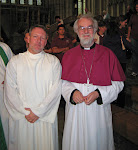Preached on Tuesday, June 5, 2007 as part of the Episcopal Preaching Foundation's (http://www.tepf.net/) Preaching Excellence Program.
Reconciliation is hot these days -- very trendy, very of the moment. You can hear people speaking in favor of it in churches and schools and in politics. Reconciliation has become much more than a word. It’s now a buzz word; one of those terms that seem to come into the collective consciousness, get used and overused almost before you’re aware of it. Buzz words like ‘reconciliation’ often have their meanings morph during their periods of popularity and sometimes they come to be understood in less complex ways as they become mundane and banal through everyday overuse.
According to the Merriam-Webster College Dictionary, “reconciliation” has several meanings. Usually it means the restoration of a friendship or of harmony between two parties. A secondary meaning is to accept something, usually something that one finds unpleasant; to be reconciled with some situation that we cannot change, but must live with. Sometimes, I believe, we mistake the two meanings. Sometimes it seems that we seek the restoration of harmony where there may have never been such harmony in the first place; and we come to hope for hugs and tearful embraces, when what we really should expect is to come to a point of acceptance of that which we might not like very much.
Buzz words like reconciliation can loose their true meanings altogether, and change from being words with a set of meanings, into something like signposts that seem to point to or point out something, rather than mean what they once were thought to mean.
My favorite signpost word these days is ‘controversial’. Controversial used to mean, “Here’s something that has caused a great deal of discussion pro and con;” or “here’s something that thoughtful people are considering and thinking about and are arriving at differing opinions about.” Nowadays you’re most likely to hear “controversial” used in a teaser for this evening’s local news broadcast, and in that setting it seems to mean “It’s sweeps month and we’re going for our highest ratings of the year. Therefore, we’ve found two loudmouths, neither of which has any particular credibility, who will disagree with each other at very high decibel levels, and with a plethora of bombast. You won’t be able to look away, sort of like when you see an accident on the highway, but that’ll mean our ratings are up, and so are ad revenues; so stay tuned for the controversy!!!!!!!” Controversial has come to be a signpost that indicates a manipulated disagreement for the sake of the spectacle.
Likewise, reconciliation can mean, “I hate you and everything you stand for, but I’m so conflict-averse, I cannot stand to have you not like me. Therefore, I’m going to compromise a lot of what I believe in in order to be seen as in agreement with you.” Or it can mean, “I cannot handle too much complexity, because for me, complexity creates anxiety. Therefore, even if there are legitimate differences between two sides, I must force them into compliance with one another so that I can make them fit into an uniform intellectual box that doesn’t create anxiety for me.”
Reconciliation, the buzz word, seems to point to anxiety -- about conflict and about difference. Sometimes when we seek reconciliation, it seems what we seek is to collapse divergent forces or impulses into a kind of harmony that we believe will end our anxiety. We want a resolution, and the sooner the better. Dr. Phil and Oprah can pull it all together in about 48 minutes less the commercials, so why can’t we? We want the plot wrapped up, we want good to win and evil to lose, we want the marriage to be saved, the hyperactive kids made manageable, the miracle diet to succeed, and the warring couple, or estranged family members to hug and make-up while the credits roll over their tearstained, reconciled faces.
An end to conflict and complexity, a simple and serene harmony; they seem like desirable goals, don’t they? They seem, dare I say it, almost Christian, don’t they?
Well, perhaps. But there is more to reconciliation than an end to anxiety and divergence. Perhaps there is that second meaning that we can explore. There may be a reconciliation that exists that does not cost us our integrity. There may be a reconciliation that does not pave over our differences with a thin veneer of consistency. There may be a reconciliation that enlarges rather than collapses; that encompasses a diverse and complex reality, rather than recreates a dying past.
I’m reminded of how a friend of mine who is also a recovering alcoholic in Alcoholics Anonymous describes ‘acceptance.’ Acceptance is a pretty big topic around AA. There’s that whole “accept the things we cannot change” thing from what AA calls the Serenity Prayer -- and which we seminary educated theologians recognize as classic Niebuhrian Neo-Orthodox Realism. My friend describes acceptance this way; she says, “To accept something does not mean that I must whole heartedly embrace it and claim it to be the best thing that’s ever happened to me; not does it mean that I should only begrudgingly and bitterly admit something with as much resentment and repulsion as I can muster. Rather, acceptance means that I merely acknowledge the reality of what is before me; that I accept people and circumstances for what they are, and not try to change their reality; nor my own, in light of the new realities I am encountering.”
Here is not false harmony or unity. Here is not a bitterness or repulsion. Here is merely acceptance of a reality that is bigger than oneself, a reality that is beyond my control.
Jesus gives us an example of this kind of reconciliation in his experience in the Garden of Gethsemane on the eve of his trial and execution. The scene appears in all the synoptic gospels, and it carries a profound weight in each. It is amazing, really, when you think about it. One way to look at Jesus’ struggle to accept his fate in Gethsemane is to see it as a moment of weakness. Does this struggling, anguishing Jesus look like a King-Messiah? Is this the same Jesus that was with God in the beginning and is shortly returning to the realm of the Supreme Being? Down south we would say about this Jesus, “He tow (torn) up!” He is distressed, agitated and grieved. He throws himself on the ground, and prays fervently to God, “Father, if it is at all possible, let this cup pass from me. Yet, not what I want but what you want.” Or as the King James Version translates Luke, “Nevertheless not my will, but thine, be done.”
In the agonizing moments in Gethsemane, Jesus is clearly not reconciled to his fate. He wants to escape the trial and torture he knows awaits him. Yet, he comes to a place of acceptance, a place of reconciliation… He comes to accept what lies before him, and he comes to accept it as a reflection of God’s will. Indeed, as we look back through our theological lenses, we see that the fate Jesus momentarily sought to escape was that which was to prove to be the reconciliation of the whole world to God through Jesus. What a loss it would have been if Jesus had balked -- if he had chosen to turn his back on the horrible reality that awaited him.
If Jesus can accept death on a cross, what then can I not accept? If Jesus can become reconciled to crucifixion, what is it that I will be unwilling to endure? If Jesus can forgive those who tortured, humiliated, and executed him, who is it that I cannot forgive? Who can I not be reconciled with?
One of our bishops tells the story of meeting with some of her counterparts in the Anglican Communion from Africa. In talking about the troubles that now face our communion, the bishop confessed that she did indeed know and respect many gay and lesbian couples. She was asked, “When the men live together, just the two of them, who cooks for them?” She replied, “Well, they usually share the cooking or if one or the other particularly enjoys it, he will do most of the cooking.” Men doing the cooking! Her African colleagues were shocked! Nothing like that goes on where they are from, they said, nor should it.
This story helps me to realize that though we are all one in Christ Jesus, we are often from very different places, and even from very different times. The 21st century in North America is quite different from the 21st century in parts of sub-Saharan Africa. We live in the world in different ways, and we encounter the gospel of Christ in different ways.
It seems impossible for me to embrace a reality that would restrict women to household chores regardless of their desires or gifts. Likewise, it must seem impossible for others to be forced to acknowledge that gay and lesbian people are full and equal partners in society and in ministry when they have no direct experience of gay folks, or worse yet, have been filled with inaccurate, defamatory propaganda about gay people.
But can I be reconciled to those with more traditional views of gender roles? Yes, I can. I may not like it, and it may seem to me to contradict the essence of the Christian gospel but I can accept there are places in the world that are much like America and The Episcopal Church of just a few decades ago.
And that seems an important aspect of our current debate: where are we right now in history, and where have we been? There is something uniquely American about our forward looking, justice seeking mindset. Americans are always essentially optimistic. We seek to right wrongs and to build a better nation and society almost as a matter of course. We have never known a national reality that we were completely powerless to change. No king has ever forced his will upon us and remained in lordship over us. No cadre of oligarchs has ever established a permanent junta here. We tend to move forward convinced of our right to do so and assured of the resources we need to make progress. We tend to become enamored of our successes and forget the struggles that have been fought to bring about those successes. The fight for women’s suffrage lasted nearly 100 years in this country. Suffragists were threatened, harassed, beaten, and imprisoned. It was ugly and bloody at times, and it went on for a very long time. The fight for civil rights for African Americans was long -- and it was deadly. The modern gay and lesbian rights movement began almost 30 years ago, and still the US Army and the Cracker Barrel restaurant chain can fire you merely for being gay.
How is it that we can be so disdainful of those who are not where we are yet, when we have only very recently (and I would add ‘incompletely’) gotten here? The righteous indignation of those on one side of the current debate is misplaced. We might do well to remember that we are very recently redeemed from our own sinfulness, and should go gently when pointing out what we believe to the sinfulness of others. We need to remember our own history, and to recognize our own limitations.
And by a similar token, others involved in our current debate might need to remember their own limitations. The sexual orientation of the Bishop of the Episcopal Diocese of New Hampshire is as relevant to the life of the church in Nigeria as the sexual orientation of the Governor of the State of New Hampshire is to government of Nigeria.
We live in a wide world, with great disparities. There are differences in education, healthcare, infrastructure, economic opportunity, not to mention social and political equality, that divide much of the world. There are differences in theologies, understandings of authority, and interpretation of Scripture that divide the church.
However, though we are many, and encompass many differences, we are one in Christ Jesus. We are reconciled to God by the birth, teaching, death and resurrection of Jesus of Nazareth. Yet we are not reconciled to one another. Perhaps because we are not seeking the right kind of reconciliation. We are not one in terms of social roles, economic wealth, access to political power, education. It is likely that we will not be uniform in very many aspects of our theologies. A survey of recent or ancient church history would show that we have never had one uniform response to the gospel of Christ. It is vanity to think that we will find such uniformity now, when we have never known it before. We are not one in and of our selves. We are one in Christ Jesus, and we can be one only in Christ Jesus.
Others may try to establish covenants that harmonize theological interpretations of scripture, or that curtail any innovations on the part of one province or another of Christ’s church. But the New Covenant established by Jesus himself is the covenant that draws us together as nothing else can. Christ died for each of us -- and more importantly rose again to reconcile each of us to God, to restore all of us to a life forever in him.
In our feeble, failing way, we seek to experience some of the glory of that reconciliation in the reconciliations we seek with each other. We want the church to be like an episode of Oprah, where we’re all hugging and crying as the credits roll.
Well, I’m not sure that that’s what we’re likely to create here on this earth. But I believe we can find a reconciliation that is more like the acceptance that my AA friend describes. We can and should accept each other’s realities, even if we believe there to be inequalities or theological errors inherent in those realities. We can accept one another; we can be reconciled to one another, because Christ has reconciled us all by his cross and resurrection. What, really, is there left for us to argue about?
27 June 2007
Sermon on Reconciliation
Subscribe to:
Post Comments (Atom)







1 comment:
Let me leave the first, perhaps only, comment here and let you know that my preaching group pretty much hated this sermon. Too didactic, too intellectual, too editorial. Can't say that I disagree...
Post a Comment